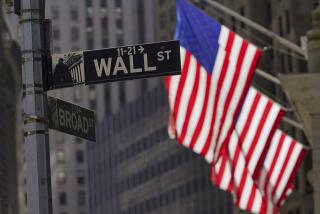Longer-Term T-Bond Yields Continue Slide
- Share via
NEW YORK — Longer-term Treasury bond yields on Tuesday continued to sink toward generational lows reached in March. As borrowing costs fall, U.S. companies are stepping up with a flood of bond issues to raise capital or refinance outstanding debt.
The yield on the 30-year T-bond ended at 4.61%, down from 4.64% on Monday and matching its level on March 12, which was the lowest since the mid-1960s.
The 10-year T-note, a benchmark for mortgages, ended at 3.61%, down from 3.64% on Monday and the lowest since March 12, when it hit 3.58%. The generational low of 3.56% was reached March 10.
Demand for longer-term Treasury issues Tuesday was fueled in part by car bombings in Saudi Arabia that raised the specter of a new cycle of terrorist attacks, traders said. Investors who are seeking relative safety often turn to government bonds.
Some buyers also are betting that the Federal Reserve will work to pull longer-term interest rates lower in coming months, analysts said. That possibility was given more credence last week after central bank policymakers warned that the economy is at risk of falling into a deflationary cycle.
“The Fed is probably near the end” of reductions in short-term rates, said Peter Cordrey, who oversees a $30-billion bond portfolio at Prudential Investment Management in Newark, N.J.
“They’re going to look at other ways” to spur growth, including purchases of debt securities, he said.
As Treasury yields slide, they can pull other long-term yields down as well, including those on corporate bonds. That has allowed companies such as General Dynamics Corp., Maytag Corp. and Cargill Inc. to borrow at bargain-basement rates over the last two days, traders said.
Average yields on corporate bonds with a rating of BAA, the low end of the investment-grade scale, have fallen to 6.41% from 6.64% before the Fed meeting last week, according to Moody’s Investors Service. They now are at their lowest levels since August 1967.
The bonds are finding no shortage of buyers, even though some experts say yields have become too meager.
“I don’t think investors are compensated for the risk they’re taking in the asset category,” said Michael Kastner, managing director and head of taxable fixed income for Deutsche Bank Private Wealth Management in New York. He has been reducing his corporate bond exposure and passed on this week’s offerings.
Corporate bonds have benefited from a torrent of cash in recent months as some investors have gone in search of higher yields than are available on money market funds and other short-term accounts.
But some portfolio managers warn that the rush into bonds could easily reverse, driving yields suddenly higher.
“The thing we’ve learned over the last few years is that the backdrop can change pretty quickly and the sentiment swing can be brutal,” said Mitchell Stapley, chief fixed-income officer for Fifth Third Investment Advisors in Grand Rapids, Mich.
More to Read
Inside the business of entertainment
The Wide Shot brings you news, analysis and insights on everything from streaming wars to production — and what it all means for the future.
You may occasionally receive promotional content from the Los Angeles Times.










